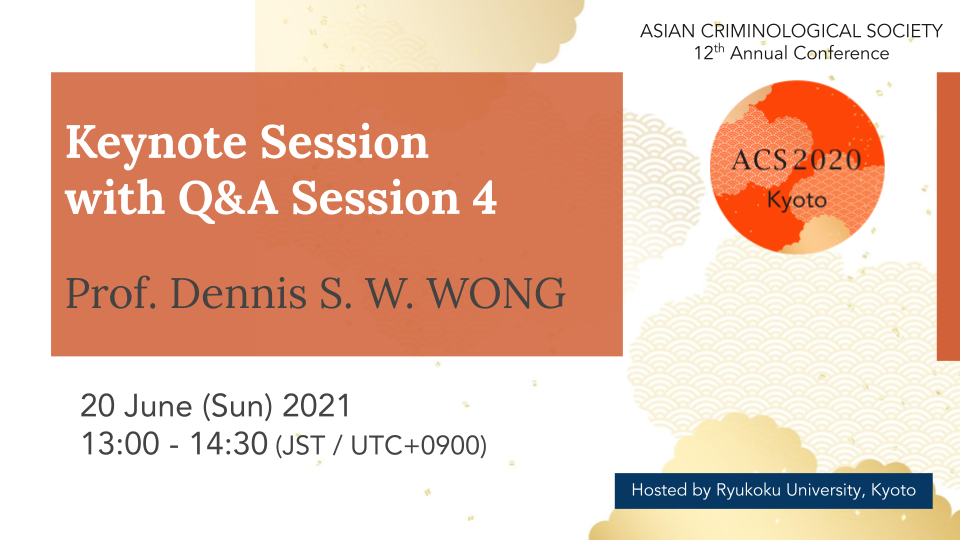2021.08.06
[Report of the ACS2020] Keynote Session with Q&A Session_Prof. Dennis S. W. Wong
Cybercrime Perpetration and Victimization among Adolescents: Prevalence, Risk Factors and Preventive Strategies
The Asian Criminological Society 12th Annual Conference (ACS2020), hosted by Ryukoku University, was held online for four days from June 18 to 21, 2021. The purpose of the conference, the second of its kind to be held in Japan after the 2014 Osaka conference, was to promote the growth of criminology in Asia and Oceania, and to promote academic exchange with advanced regions of criminology such as the United States and Europe.
>> ACS2020 Program https://acs2020.org/program.html
The overall theme of the conference is "Crime and Punishment under Asian Cultures: Tradition and Innovation in Criminology". The aim was to promote understanding of the social systems and culture and measures against crime and delinquency in Japan, which is said to be "the country with the least crime in the world".
The following is a summary of the Keynote Session with Q&A Session, which was held live streaming at the conference.
- Keynote Speaker: Dennis S. W. Wong (Professor, Department of Social and Behavioural Sciences, City University of Hong Kong, Hong Kong)
- Chair: Kana Sasakura (Professor, Faculty of Law, Konan University, Japan)
- Date: 13:00-14:30, 20 June, 2021
- Keywords: Cybercrime, Routine Activity Theory, RAPID-IT-CRY, Factor Analysis, Correlation between Perpetration and Harm


Dennis S. W. Wong (Professor, Department of Social and Behavioural Sciences, City University of Hong Kong, Hong Kong)
With the rapid growth of the Internet and social networks, the Information and Communications Technologies (ICT) creates ample opportunities for educational, financial, social, and personal activities. The advancement of ICT in digital age is a double-edged sword which brings both convenience and risk to our daily life. Previous studies on cyber behavior have found that adolescents who spend a great deal of time on the internet are prone to having more negative online experiences. This presentation firstly highlights common types of cybercrimes found in Hong Kong. It then discusses some typical cases of cybercrime victimization among adolescents. Using a sample of 1,533 secondary school students, with the routine activities framework in mind, this presentation discusses the relationships between some risk factors (including a lack of cyber safety awareness, normative belief about aggression, and moral disengagement) and cyber deviant behavior/victimization.
In light of the potential consequences of cybercrime and victimization on youth, the presentation also introduces a newly developed RAPID Identification Tool of Cyber Risk for Youth (RAPID-IT-CRY) which is generated from the same empirical study. Factorial validity of the tool was verified using confirmatory factor analysis. The analyses supported an eight‐item scale with a two‐factor structure. The eight‐item tool RAPID-IT-CRY was found to possess good internal consistency and concurrent validity. It is believed that this tool is particularly useful for frontline practitioners developing intervention programs and the tool also has the potential to advance epistemological methods and clinical research related to cybercrime prevention.
Summary of the Q&A Session
Question 1: Does "cybercrime” include hate speech?
Answer 1: Yes, it does. “Cybercrime” includes cyber deviant behavior and cyber perpetration. Sending annoying or obscene messages may relate to hate speech.
Question 2: How old are children when they start to gain access to computers in Hong Kong?
Answer 2: In Hong Kong, children are allowed to use computers in primary school at age of 6. They are encouraged to use computers or iPads to study at home or when handing in homework. During the Covid pandemic, many schools are in lock down so nearly everybody has access to computer or iPad. Government or local organization provided financial support to ensure children’s access to computers. Many professionals are now advising parents to keep computers in the dining room where parents can monitor what children are browsing on the internet. Younger people are vulnerable to information on the internet and cannot avoid cyber victimization. Cyber-perpetrators are very clever and younger people are not aware of all the tricks they use. Parents should discuss with children about all the potential dangers of internet. They should remember and share all the cases around the world and talk with children and inform them.
Question 3: Have traditional crimes been decreasing and cybercrime increasing in Hong Kong?
Answer 3: The overall number of juvenile delinquency has decreased in Hong Kong. Younger people are staying at home and communicate through cyberspace. They seldom go out to the streets, so now major delinquent crimes are cybercrime and drug-taking.
Question 4: In what way is cybercrime different in Asia or Hong Kong?
Answer 4: I have read articles published elsewhere but do not think there is much difference around the world. A lot of young people call themselves “global citizens”. When they play and communicate on the internet, while there are still differences, they also share a similar culture. Cybercrime perpetration and victimizations are similar as well. However, moral disengagement is common in Asians, which leads to more use of the internet and more vulnerability to becoming victims. The Western world has more liberal parental monitoring and higher sense of cyber security. Is there a cultural bias among various countries? I am sure there is. For example, hate crime is not common in Hong Kong, Taiwan, or mainland China, because the overall population is composed mainly of Chinese people. So-called racial discrimination is not very serious in much of China. On the other hand, in the U.S. or Europe, there is more cultural migration and mixing of different races, so cultural bias might be more common. This may be an issue. Oriental culture is more collective and Western is more individualistic. Thus in Asia, interventions or restrictions are more authoritarian. There is a cultural difference. Cybercrime is transnational and transcends culture. However, since there are cultural differences, transnational cooperation between countries is very difficult.
Question 5: Are online grooming and sexting illegal in Hong Kong? They are not illegal in Japan.
Answer 5: Legislations in Hong Kong are outdated. There is no law on specific online related or cyber related legislation in Hong Kong. There is only a traditional set of law or ordinance. Thus, there is a growing voice for legislation on cybercrime. For example, in a case of online grooming, police will you with “illegal use of a computer” since there is no specific legislation. Everything can be grouped as “illegal use of a computer.” If you hire a good lawyer and argue this loophole, you might escape charges.